“Global Application Delivery Controllers Market to reach a market value of USD 9.1 Billion by 2031 growing at a CAGR of 12.6%”
The Global Application Delivery Controllers Market size is expected to reach $9.1 billion by 2031, rising at a market growth of 12.6% CAGR during the forecast period.
With the increasing number of digital banking services and online transactions, BFSI organizations are investing heavily in ADC solutions to ensure optimal application performance, reduce latency, and provide secure access to their services. Thus, the BFSI segment witnessed nearly 1/4th revenue share in the market in 2023. This prominence is due to the urgent requirement for secure and efficient application delivery in the banking and financial sectors, where data security and rapid transaction processing are paramount. The stringent regulatory requirements and the necessity for robust security measures further drive the demand for advanced ADC solutions in this sector.
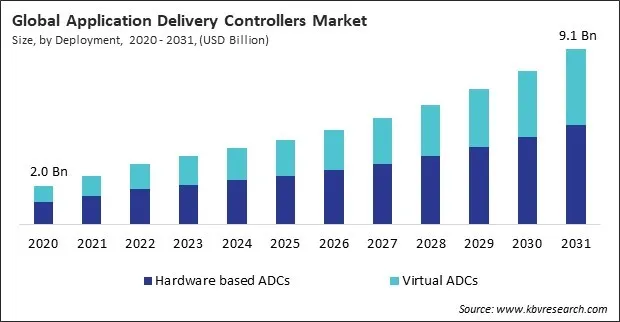
The proliferation of mobile applications has further added to the explosion of internet traffic. With smartphones and tablets becoming ubiquitous, users expect fast, seamless access to applications anywhere, anytime. Whether it's banking, gaming, social networking, or business applications, the need to deliver these services reliably across multiple platforms has never been higher. ADCs enhance mobile application performance by managing traffic flow between devices and back-end servers, reducing latency, and ensuring high availability. Additionally, the rise of edge computing, enabled by 5G's enhanced connectivity, will further highlight the importance of ADCs in modern network architectures. As businesses increasingly adopt edge computing strategies to process data closer to the source, ADCs will facilitate efficient communication between edge devices and centralized data centers. This will enhance responsiveness for applications that rely on real-time data analysis and decision-making. Therefore, as internet traffic continues to grow and the growth of 5G networks will drive significant demand for ADCs.
However, managing ADCs post-deployment can be resource-intensive. ADCs require ongoing monitoring, maintenance, and fine-tuning to ensure optimal performance. This often necessitates a team of skilled IT personnel familiar with ADC technology's intricacies. For organizations without dedicated IT departments or access to specialized professionals, the cost and effort of managing ADCs can be prohibitive. Thus, the complexity of managing ADCs can lead to slower adoption rates, hindering market growth.
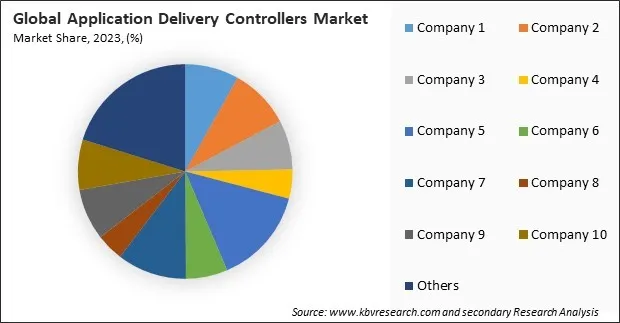
The leading players in the market are competing with diverse innovative offerings to remain competitive in the market. The above illustration shows the percentage of revenue shared by some of the leading companies in the market. The leading players of the market are adopting various strategies in order to cater demand coming from the different industries. The key developmental strategies in the market are Acquisitions, and Partnerships & Collaborations.
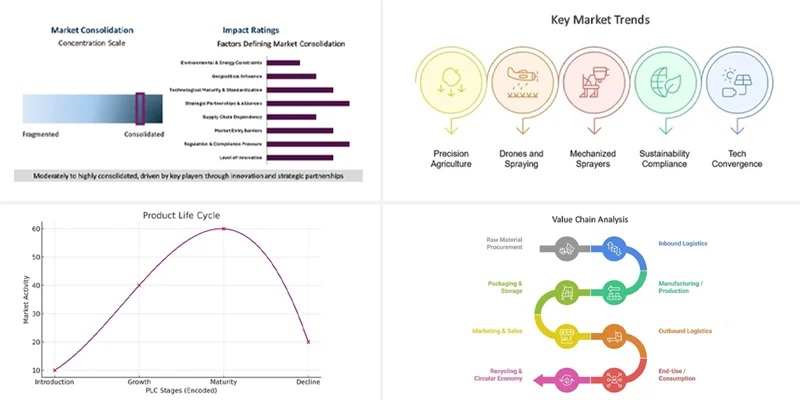

Based on deployment, the market is bifurcated into hardware based ADCs and virtual ADCs. The hardware based ADCs segment garnered 58% revenue share in the market in 2023. These ADCs are physical devices installed within an organization’s data center, providing robust capabilities for traffic management, load balancing, and enhanced security features. Their high-performance nature suits enterprises with significant traffic demands and complex application environments.
On the basis of enterprise size, the market is classified into SMEs and large enterprises. The SMEs segment recorded 45% revenue share in the market in 2023. Although small & medium enterprises (SMEs) typically operate on tighter budgets compared to large enterprises, many are beginning to prioritize investments in technology that can enhance their operational efficiency and customer satisfaction. The adoption of cloud-based ADC solutions is particularly appealing to SMEs, as these solutions offer the flexibility and scalability needed to support their growth without requiring substantial upfront capital expenditures.
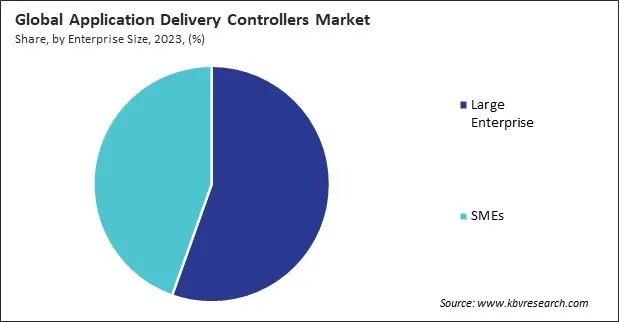
By end use, the market is divided into IT & telecom, BFSI, government, healthcare, retail, and others. The retail segment procured 18% revenue share in the market in 2023. Retailers increasingly rely on ADCs to enhance their online platforms and ensure seamless customer transactions, regardless of the channel used. It is imperative for retailers to deliver personalized experiences and manage high traffic volumes, particularly during peak purchasing seasons, in order to remain competitive in the digital landscape.
Free Valuable Insights: Global Application Delivery Controllers Market size to reach USD 9.1 Billion by 2031
Region-wise, the market is analyzed across North America, Europe, Asia Pacific, and LAMEA. The North America segment acquired 35% revenue share in the market in 2023. The region's leadership in the IT and telecommunications sectors is a result of its sophisticated technological infrastructure, high levels of digital adoption, and the presence of numerous key players. Companies in North America are increasingly investing in application delivery solutions to enhance performance, ensure security, and manage the growing complexity of applications in hybrid and multi-cloud environments.
| Report Attribute | Details |
|---|---|
| Market size value in 2023 | USD 3.6 Billion |
| Market size forecast in 2031 | USD 9.1 Billion |
| Base Year | 2023 |
| Historical Period | 2020 to 2022 |
| Forecast Period | 2024 to 2031 |
| Revenue Growth Rate | CAGR of 12.6% from 2024 to 2031 |
| Number of Pages | 235 |
| Number of Tables | 360 |
| Report coverage | Market Trends, Revenue Estimation and Forecast, Segmentation Analysis, Regional and Country Breakdown, Competitive Landscape, Market Share Analysis, Porter’s 5 Forces Analysis, Company Profiling, Companies Strategic Developments, SWOT Analysis, Winning Imperatives |
| Segments covered | Deployment, Enterprise Size, End Use, Region |
| Country scope |
|
| Companies Included | Citrix Systems, Inc. (Cloud Software Group, Inc.), Dell Technologies, Inc., Fortinet, Inc., Barracuda Networks, Inc. (KKR & Co. Inc.), Cisco Systems, Inc., Microsoft Corporation, Broadcom, Inc., Cloudflare, Inc., Akamai Technologies, Inc., Amazon Web Services, Inc. (Amazon.com, Inc.) |
By Deployment
By Enterprise Size
By End Use
By Geography
The Market size is projected to reach USD 9.1 billion by 2031.
Rising Demand for Cloud Services are driving the Market in coming years, however, High Costs of Advanced ADC Solutions restraints the growth of the Market.
Citrix Systems, Inc. (Cloud Software Group, Inc.), Dell Technologies, Inc., Fortinet, Inc., Barracuda Networks, Inc. (KKR & Co. Inc.), Cisco Systems, Inc., Microsoft Corporation, Broadcom, Inc., Cloudflare, Inc., Akamai Technologies, Inc., Amazon Web Services, Inc. (Amazon.com, Inc.)
The expected CAGR of this Market is 12.6% from 2024 to 2031.
The Large Enterprise segment is leading the Market by Enterprise Size in 2023; thereby, achieving a market value of $4.9 billion by 2031.
The North America region dominated the Market by Region in 2023; thereby, achieving a market value of $3.0 billion by 2031.
Our team of dedicated experts can provide you with attractive expansion opportunities for your business.
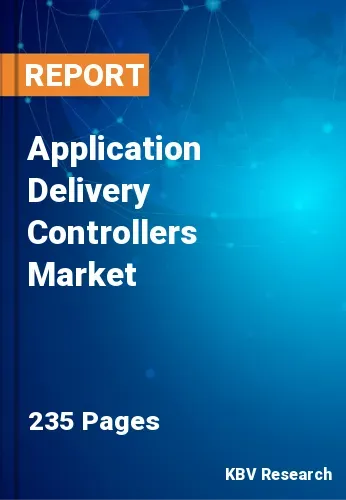
 Drivers
Drivers
 Restraints
Restraints
 Opportunities
Opportunities
 Challenges
Challenges
